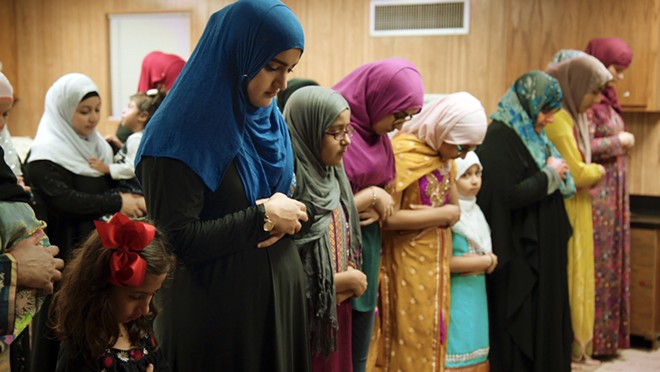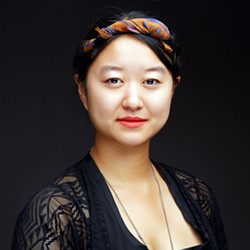
Courtesy Picture / PBS
The three-part docuseries City Referred to as Victoria is airing on PBS and likewise streaming on different platforms.
Within the three-part docuseries A City Referred to as Victoria, filmmaker and former Houston-area resident Li Lu follows the members of a Muslim neighborhood in Victoria, Texas, in 2017 when their native mosque is destroyed by a fireplace.
When officers uncover that the hearth was intentionally set and that Islamophobia was the rationale their place of worship was now gone, the small city is pressured to confront its darkish previous and discover a technique to heal from the hate that has engulfed them.
By way of intimate interviews throughout a time of racial rigidity, Lu steps in to seize a nuanced portrait of a neighborhood prepared to point out the world that regardless of the hostility and concern they’ve skilled, there’s a technique to transfer ahead from the trauma.
Throughout a current interview with the Present, Lu, who was born in China and moved to Texas within the sixth grade, talked about listening to the information of the mosque hearth for the primary time and what motivated her to return to the Lone Star State to inform the story.
Episode 1 of A City Referred to as Victoria premieres on PBS on November 13. Episodes 2 and three premiere November 14. The docuseries may even stream on Amazon, the PBS web site, PBS App, PBS YouTube Channel and iTunes.
What was your individual expertise like rising up in Texas?
Properly, we first emigrated to the U.S. once I was within the first grade. We lived in West Philly. We moved across the nation rather a lot. In the end, we went to Houston, Texas. So, I spent the youth of my childhood and younger maturity in Sugar Land. It was a really small city with a suburban really feel. There’s an enormous Asian inhabitants. It was various however nonetheless very conservative. So, as a non-white individual rising up in a small Texas city, there have been rising pains.

Courtesy Picture / PBS
Fillmaker Li Lu is a former resident of the Houston space.
What resonated with you concerning the hearth that occurred in Victoria in 2017 that made you need to go down there and inform that story?
At the moment, I used to be already dwelling in Los Angeles. That day, I used to be seeing all of the protests taking place on the airports due to [then-President Trump’s Muslim travel ban]. Then, I noticed the information of the hearth throughout my social media from mates from highschool and everybody again residence. It simply broke our hearts as a result of it was in our yard. This was taking place in our city. Then, the subsequent day, there was a rally the place nearly 500 individuals confirmed as much as say, “This is not who we’re.” That made me really feel so emotional as a result of it confirmed me a chunk of being Texan that I actually missed. On the similar time, it was laborious to carry these two photographs in the identical body – a peace rally and a burned home of worship. To me, that confirmed the complexity of Texas.
The hearth occurred in January 2017. How shortly had been you again in Victoria to begin documenting the occasions that adopted, and did you have got an thought what it will flip into?
We had been on the bottom in Victoria initially of March. Initially, it was imagined to be a brief movie concerning the rally and the GoFundMe being so profitable. However as I used to be filming, I noticed how rather more I needed to study these people. I had this nagging query behind my thoughts, which was how lengthy is that this solidarity going to final? That is why we continued filming. We realized we had this job to finish this portrait and inform the total story.
How had been you in a position to join with the members of this Muslim neighborhood in such an intimate method that they opened their hearts and minds to you?
I needed to construct an actual relationship with these people. There have been many moments the place I wasn’t filming. I actually needed to be sure that these individuals knew who I used to be and that the questions I used to be asking had been issues that I cared about. We constructed that relationship little by little. So, quite a lot of the vulnerability and the discussions we have now comes from a deep place of intimacy we had been in a position to create and develop as people over the course of that point.
I used to be actually impressed with the best way you used your individual voice within the collection. It was in a really minimalist method, however while you spoke, you requested the questions that I needed answered at the moment. It actually felt such as you had been there to hear. Was {that a} acutely aware determination to confront the storytelling in that method?
Completely. I imply, what’s so profound about this venture for me is that for most individuals, they do not even have the time to take a seat and take into consideration how they really feel. Our interview area grew to become a really sacred area the place they actually had time to consider how they felt. That area was truly very therapeutic for everybody concerned as a result of it was an area the place individuals may truly mirror.
As you had been filming this docuseries, how did the narrative change in any method? In addition to considering it was going to be a brief movie as an alternative of a collection, did it shift thematically?
To be sincere, I used to be actually simply letting the story lead me. I had instincts relating to what occurs to people and communities like this, particularly in South Texas. However I actually needed to see how this was going to play out and what it will take for this mosque to be rebuild and what would occur on the trial. I needed to stay open to all these issues.
We had an incident right here in San Antonio lately the place a Muslim lady had rocks thrown at her automobile, presumably as a result of she was carrying a hijab. With the Israel-Hamas battle at a boiling level, what message do you hope your docuseries reveals?
By no means did I believe that we’d be releasing this collection throughout this horrible and tough time. What hurts me most is seeing these acts of hate taking place to mosques and synagogues and homes of worship. I actually hope individuals can see this story and grow to be an ally and say, “We cannot let these items occur in our neighborhood.” I hope that lady is OK. I hope the individuals locally are reaching out to that group of individuals to say, “This is not what we take into consideration you.” When issues are tough, simply the act of claiming, “I care about you” can go up to now. If something, I hope [A Town Called Victoria] offers individuals a path to really feel impressed sufficient to be higher members of their communities.
Subscribe to SA Present newsletters.
Observe us: Apple Information | Google Information | NewsBreak | Reddit | Instagram | Fb | Twitter| Or join our RSS Feed





